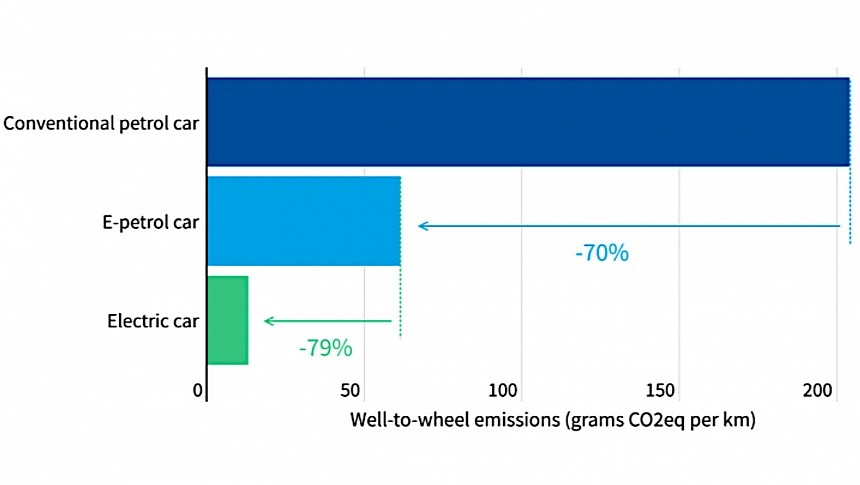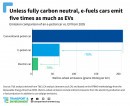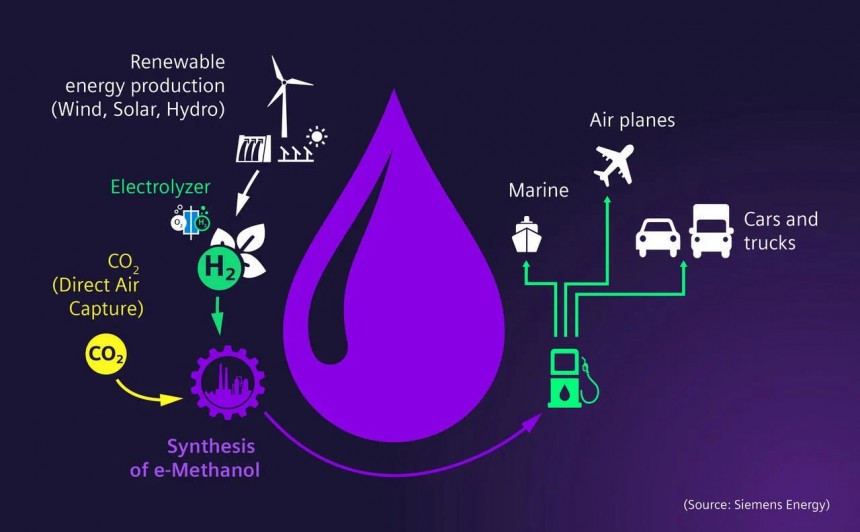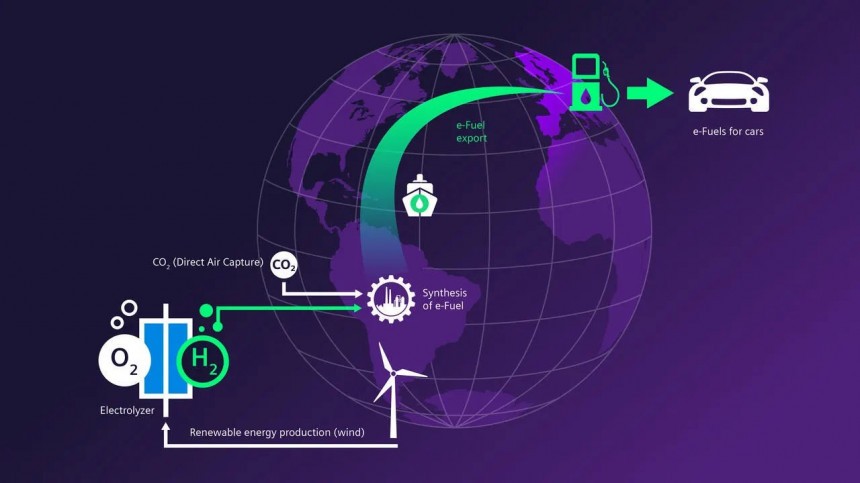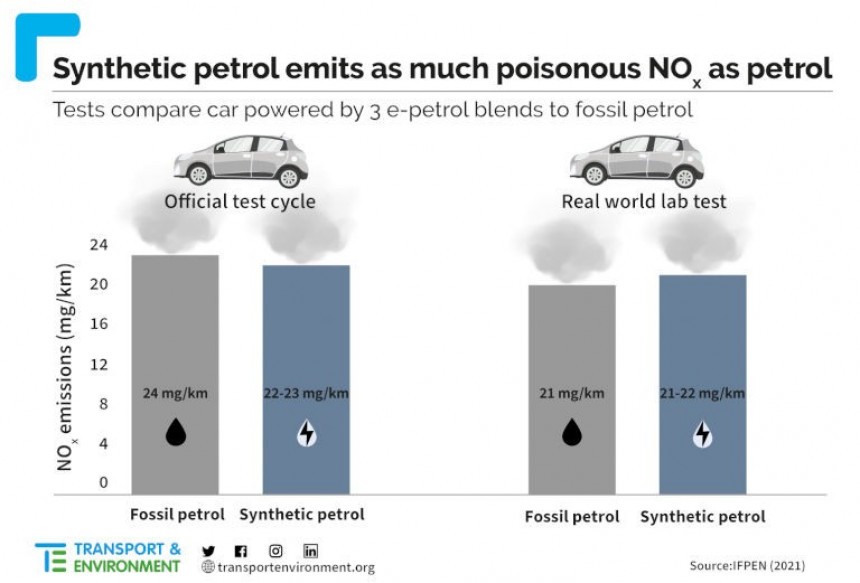You may have heard by now that the German auto industry strongly believes there's no need for retiring internal combustion engines after 2035, despite the EU Commission (and common sense, may I add) requiring their phasing out. E-fuels are the new kid on the block that promises emission-free ICEs! Too bad that Europe's leading clean transport campaign group, the one who kickstarted the Dieselgate scandal, is on the watch.
Transport & Environment (T&E) was founded 30 years ago. Since then, the European Federation for Transport and Environment – the official name of this international non-profit association – claims it dramatically influenced EU Parliament decisions regarding CO2 emission standards for the transportation sector.
T&E is best known to petrolheads for being the most vocal advocate of phasing out ICEs in the EU after 2035. T&E's fight is ongoing because Germany convinced the EU to allow a post-2035 exception for the engines fueled by the new, miraculous, and yet-to-be-proven e-fuels, the synthetic fuels allegedly made only from CO2 and renewable energy.
But, hey, you are fortunate because scientists discovered how to make green fuel out of thin air. In fact, it's made from the CO2 accumulated in the atmosphere, and the electricity needed is from renewable sources. Basically, when burning e-fuels inside an ICE, you release the same amount of CO2 that was used to make the e-fuel.
So, e-fuels are marketed as "carbon neutral," and they are praised for slashing "up to 90%" of the CO2 emissions compared to conventional ICEs. At least in theory. By the way, do you remember when diesel engines were labeled "green" compared to gasoline engines because they had less CO2 emissions? It just came to my mind for no particular reason.
Now, e-fuels make a strong case when we look at the numbers. There are over 250 million passenger cars in the EU, and 99% of them are ICE cars. Almost half of them run on diesel, which is very bad for our health and the environment because of NOx.
Every year, around 10 million cars are added to the total fleet, so by 2035, there will be 370 million cars driving daily in Europe. Only a tiny part will be electric or use hydrogen, while the big chunk of around 300 million will still rely on ICEs.
This means the alarmingly high pollution level of the transportation sector requires a faster decarbonization solution than electrification. While I'm an electrohead, I admit that converting all these cars to EVs is impossible in just a few years.
With that in mind, replacing fossil-fuel-based fuels with e-fuels that supposedly can cut emissions and pollutants from ICEs in half is a welcome idea. As an electrohead, I agree that current ICE cars should use these e-fuels, but also the ICE cars that will be produced by 2035 and then used for another 10 to 15 years.
It's common sense to use e-fuels until the complete phasing out of internal combustion engine cars. But why on Earth would anyone want to continue manufacturing ICEs after 2035 and use the non-zero-emissions e-fuels against the goal of complete decarbonization of the transportation sector?
Also, producing e-fuels has its share of uncomfortable details and hidden truths, like it's five times more energy intensive than producing batteries, and the costs outperform even the hydrogen fuel cell technology. But, hey, we heavily subsidize the EV transition, so why not pour money into e-fuels?
What T&E points out is that after Germany opposed all ICEs phasing out in 2035, the EU's Renewable Energy Directive methodology (RED) stated that e-fuels must reduce GHG emissions of combustion engines by at least 70% compared to current fossil-fuel-based fuels.
While 70% seems a lot compared to the current 95 g/km value, it's still much more than the "zero tailpipe CO2 emissions" level that all the other propulsion systems must comply with from 2035. The 95 g/km refers to the average tailpipe CO2 emission level per manufacturer fleet.
Pooling EVs and guzzlers is widespread, especially among German premium car manufacturers. So, T&E fears the car industry could force the watering down of emission standards by pooling e-fuel cars, EVs, and FCEVs.
In my opinion, this means there's a high risk that the e-fuel cars' tailpipe will exceed 30 g/km. Especially since the car industry lobbyists are unhappy that only 100% carbon-neutral e-fuels are eligible for the ICE phasing-out exemption. Will the EU accept a blend of e-fuels and oil-based fuels after 2035? I hope not.
All of this is still speculation at this point. However, based on future emissions standards carved by the EU and the expected technological evolutions of engines, fuel production, and the European electricity grid mix, T&E made some interesting calculations.
According to their calculations, the well-to-wheel emissions for a conventional petrol VW Golf-sized car in 2035 would result in around 211 g/km CO2eq. To put things in perspective, the current VW Golf 1.0 TSI has 122 g/km CO2 emissions by WLTP standards. According to the EU framework, by 2030, this value should be halved to around 60-70 g/km.
So, T&E suggests that three times more grams per kilometer of CO2eq (!) will be attributable to extracting and transporting oil, refining and storing gasoline, and finally transporting it to the gas station for refueling the Golf. I guess now the "EV-related pollution" conundrum is not so dramatic by comparison.
If the same car were powered by a similar engine burning the 70%-lower-emission e-fuel, it would be credited to only 61 g/km CO2eq. This is a significant difference indeed, and it favors the idea of replacing conventional fuels with e-fuels, right?
I should point out that these calculations refer only to the estimated carbon intensity of well-to-wheel processes and burning the fuel inside the engine. There's no indication of efficiency or cost, which are very sensitive matters for e-fuels. Even more sensitive than for batteries, but don't let my assertion influence your perspective for now.
Speaking about thedevil batteries, a Golf-sized electric car produced in 2035 is credited by T&E with only 13 g/km CO2eq. Of course, naysayers will question the methodology and probably won't trust data from a pro-electrification NGO. After all, democracy is all about your freedom to decide who and what you believe in.
For now, T&E's estimations show us that using "conventional" e-fuels – not 100% carbon-neutral – would reduce the well-to-wheel CO2eq levels by around 70% versus the conventional gasoline. At the same time, a similar EV would slash those emissions 16-fold! My electrohead's eyebrows are also rising, trust me.
But the real comparison here is EVs versus e-fuels because EVs' well-to-wheel CO2eq emissions are estimated to be five times lower than the "conventional" e-fuels. T&E uses this as an argument for the EU to only accept 100% carbon-neutral e-fuels, which would probably be only two or three times more carbon intensive than batteries.
While e-fuels, especially 100% carbon-neutral e-fuels, could be a viable solution in sharply reducing CO2 emissions, more is needed to solve the NOx problem. T&E's real-world tests to date have shown that e-fuel engines emit almost the same NOx levels as petrol engines.
Of course, the car industry relies on various after-treatment solutions and technologies to solve the stringent NOx issue. But all of this comes with high costs in technology, poor reliability, and risks to our health.
Cheating devices and software are hard to detect. At the same time, the car industry proved it's more prone to paying some fines for harming everyone's health with profitable polluting engines instead of investing that money in actual decarbonization technologies, like batteries and hydrogen.
In the end, the T&E's analysis findings, while somewhat questionable, I admit, have the merit to expose the hidden costs of a fossil fuels-based industry. If the e-fuels were 100% carbon-free, they would qualify as the best transition solution for rapid decarbonization of the transportation sector.
Despite their drawbacks in high costs, energy-intensive, and NOx emissions due to the burning process inside ICE cylinders, society should incentivize e-fuels until the last internal combustion engine car is retired, which is around 2050, more or less.
But we really should avoid falling into the trap of putting an equal sign between e-fuels and zero-carbon solutions. And we definitely shouldn't accept e-fuels as the Trojan Horse for internal combustion engine proliferation beyond the half of this century.
T&E is best known to petrolheads for being the most vocal advocate of phasing out ICEs in the EU after 2035. T&E's fight is ongoing because Germany convinced the EU to allow a post-2035 exception for the engines fueled by the new, miraculous, and yet-to-be-proven e-fuels, the synthetic fuels allegedly made only from CO2 and renewable energy.
E-fuels are not "zero-emissions," but they are greener than fossil fuel gasoline and diesel
This is the main argument of the German car industry served to European car owners: it's not the engine in your car polluting the air you breathe; the fossil-fuel-based gasoline and diesel burning inside your beloved engine is to blame for the harmful pollutants and CO2 emissions.But, hey, you are fortunate because scientists discovered how to make green fuel out of thin air. In fact, it's made from the CO2 accumulated in the atmosphere, and the electricity needed is from renewable sources. Basically, when burning e-fuels inside an ICE, you release the same amount of CO2 that was used to make the e-fuel.
So, e-fuels are marketed as "carbon neutral," and they are praised for slashing "up to 90%" of the CO2 emissions compared to conventional ICEs. At least in theory. By the way, do you remember when diesel engines were labeled "green" compared to gasoline engines because they had less CO2 emissions? It just came to my mind for no particular reason.
Every year, around 10 million cars are added to the total fleet, so by 2035, there will be 370 million cars driving daily in Europe. Only a tiny part will be electric or use hydrogen, while the big chunk of around 300 million will still rely on ICEs.
This means the alarmingly high pollution level of the transportation sector requires a faster decarbonization solution than electrification. While I'm an electrohead, I admit that converting all these cars to EVs is impossible in just a few years.
With that in mind, replacing fossil-fuel-based fuels with e-fuels that supposedly can cut emissions and pollutants from ICEs in half is a welcome idea. As an electrohead, I agree that current ICE cars should use these e-fuels, but also the ICE cars that will be produced by 2035 and then used for another 10 to 15 years.
It's common sense to use e-fuels until the complete phasing out of internal combustion engine cars. But why on Earth would anyone want to continue manufacturing ICEs after 2035 and use the non-zero-emissions e-fuels against the goal of complete decarbonization of the transportation sector?
The answer, my friend, is blowing in the wind
I explained in another piece that the German car industry is by no means the most prolific in Europe, thanks to the very lucrative big displacement engines. Phasing out ICEs is equivalent to killing the hen with the golden eggs for the Germans. So, it's more than the eye can see.Also, producing e-fuels has its share of uncomfortable details and hidden truths, like it's five times more energy intensive than producing batteries, and the costs outperform even the hydrogen fuel cell technology. But, hey, we heavily subsidize the EV transition, so why not pour money into e-fuels?
While 70% seems a lot compared to the current 95 g/km value, it's still much more than the "zero tailpipe CO2 emissions" level that all the other propulsion systems must comply with from 2035. The 95 g/km refers to the average tailpipe CO2 emission level per manufacturer fleet.
Pooling EVs and guzzlers is widespread, especially among German premium car manufacturers. So, T&E fears the car industry could force the watering down of emission standards by pooling e-fuel cars, EVs, and FCEVs.
In my opinion, this means there's a high risk that the e-fuel cars' tailpipe will exceed 30 g/km. Especially since the car industry lobbyists are unhappy that only 100% carbon-neutral e-fuels are eligible for the ICE phasing-out exemption. Will the EU accept a blend of e-fuels and oil-based fuels after 2035? I hope not.
All of this is still speculation at this point. However, based on future emissions standards carved by the EU and the expected technological evolutions of engines, fuel production, and the European electricity grid mix, T&E made some interesting calculations.
Is "near-zero emissions" for real or just greenwashing?
Experts from T&E did the math, considering the "well-to-wheel" CO2eq emissions for petrol cars, e-fuel cars, and full-electric cars. They considered direct tailpipe emissions (which are zero for EVs, of course) and indirect emissions associated with gasoline, e-fuels, and electricity production. The "CO2 equivalent" comprises all the GHG emissions from burning fuel or sourcing electricity.So, T&E suggests that three times more grams per kilometer of CO2eq (!) will be attributable to extracting and transporting oil, refining and storing gasoline, and finally transporting it to the gas station for refueling the Golf. I guess now the "EV-related pollution" conundrum is not so dramatic by comparison.
If the same car were powered by a similar engine burning the 70%-lower-emission e-fuel, it would be credited to only 61 g/km CO2eq. This is a significant difference indeed, and it favors the idea of replacing conventional fuels with e-fuels, right?
I should point out that these calculations refer only to the estimated carbon intensity of well-to-wheel processes and burning the fuel inside the engine. There's no indication of efficiency or cost, which are very sensitive matters for e-fuels. Even more sensitive than for batteries, but don't let my assertion influence your perspective for now.
Speaking about the
For now, T&E's estimations show us that using "conventional" e-fuels – not 100% carbon-neutral – would reduce the well-to-wheel CO2eq levels by around 70% versus the conventional gasoline. At the same time, a similar EV would slash those emissions 16-fold! My electrohead's eyebrows are also rising, trust me.
But the real comparison here is EVs versus e-fuels because EVs' well-to-wheel CO2eq emissions are estimated to be five times lower than the "conventional" e-fuels. T&E uses this as an argument for the EU to only accept 100% carbon-neutral e-fuels, which would probably be only two or three times more carbon intensive than batteries.
Don't take the NOx out of the picture!
I mentioned before that T&E sparked the Dieselgate scandal centered around NOx emissions. Petrolheads will surely joke about this NGO's fixation on this particular type of emissions, but unfortunately, there's nothing to laugh about.While e-fuels, especially 100% carbon-neutral e-fuels, could be a viable solution in sharply reducing CO2 emissions, more is needed to solve the NOx problem. T&E's real-world tests to date have shown that e-fuel engines emit almost the same NOx levels as petrol engines.
Cheating devices and software are hard to detect. At the same time, the car industry proved it's more prone to paying some fines for harming everyone's health with profitable polluting engines instead of investing that money in actual decarbonization technologies, like batteries and hydrogen.
In the end, the T&E's analysis findings, while somewhat questionable, I admit, have the merit to expose the hidden costs of a fossil fuels-based industry. If the e-fuels were 100% carbon-free, they would qualify as the best transition solution for rapid decarbonization of the transportation sector.
Despite their drawbacks in high costs, energy-intensive, and NOx emissions due to the burning process inside ICE cylinders, society should incentivize e-fuels until the last internal combustion engine car is retired, which is around 2050, more or less.
But we really should avoid falling into the trap of putting an equal sign between e-fuels and zero-carbon solutions. And we definitely shouldn't accept e-fuels as the Trojan Horse for internal combustion engine proliferation beyond the half of this century.
